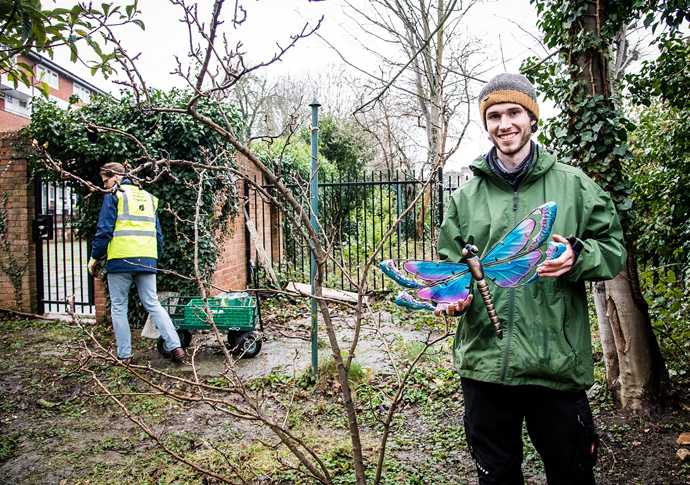Turn tarmac into parklets
Town Hall scheme to replace unused road space with greenery
Friday, 16th September 2022 — By Charlotte Chambers

Volunteers gardening at Highbury Quadrant in March 2022 to mark the launch of Islington Greener Together
EIGHT-and-a-half football pitches of new green space could be unlocked in dead-end streets under new plans to replace tarmac with greenery.
The Town Hall is to investigate whether it is possible to add small green spots known as “pocket parks” to 300 sites identified in an audit of the borough’s streets.
The government has stumped up £100,000 for a feasibility study, although private companies will be encouraged to help pay for work.
Charlotte Glazier, the council’s Greening the Public Realm director, said: “We need more urban greening, and the role has shifted from it being a desirable, nice, fluffy bit on the side to actually this is critical we get it right and get it in place going forwards. There’s been a huge shift going forwards.”
If a pilot scheme is successful in Islington, it could be rolled out citywide and then nationwide.
Ms Glazier said: “It started with meeting a councillor on a site last November and he said I’ve got an idea: let’s use a planter to slow down mopeds. And I said ‘that’s great, we can do that’. And then he said ‘it’s going to be at this dead end and five other dead ends,’ and at that point my eyes lit up because what I saw was five pocket parks which could all have 6-8 car parking bays removed.”
Turning unused parts of roads and tarmac into parklets and gardens could help ease the flooding risk because they have a permeable surface. The areas could also feature pollinating plants, a place to sit, a play area and bike racks.
Ms Glazier does, however, warn that the figure of 300 is speculative and the final number could be less – or more.
She said the potential for the scheme was revolutionary if private funders got on board.
“I thought if this is the impact for one borough what would be the impact for 32 boroughs across London?” she asked.
“In essence you’ve got the need for the private sector to invest in green solutions. You may say that sounds like greenwashing or carbon offsetting but there is more reason and incentive [now] for companies to become carbon neutral or positive.”
She plans to have finalised her feasibility study by spring 2024.
“If we manage to unlock the private investment then we can start to deliver at pace and on a scale like we’ve never done before because all existing parklets are on an adhoc basis, which are dependent on different grant awards competing for the same pot of money,” she added.